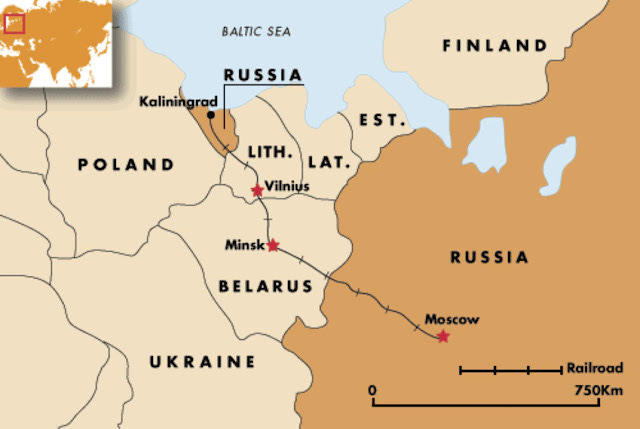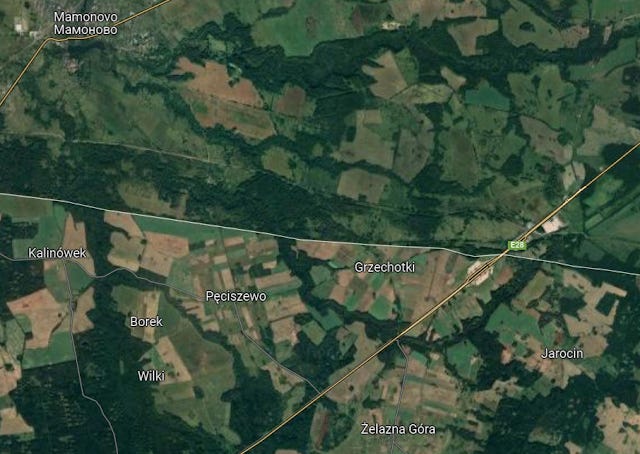Deer hunters who own their own land and hunt it for years on end know a fun little detail few others know.
Deer trails are a constant, regardless of what is happening on the land. They remain on their track for ... well ... perhaps centuries.
You can have a deer trail you've hunted in second growth forest and then have either timber harvest or fire remove all the trees on that parcel. Even though the land is barren, the deer will use the same trail, only slightly modified if an obstacle like an old fallen tree is gone, but besides that, the track remains unchanged.
As the now barren land transitions over time from forbs, to scrub, to brush, and back to forest over a decade or two, the trails remain there. Year after year even as the land changes around them, the deer trod the same trail.
Animals, people, and the earth all have their habits. That is why having a good knowledge of the past is so valuable to the present and and planning for the future.
History is sticky and geography does not change. Riding on top of both, trade routs are relatively unchanged.
(...and yes, for you WWII Geeks, that railroad line in the pic at the top is roughly the line of advance of General Hoth's 3rd Panzer Group from East Prussia to the gates of Moscow.)
Take poor historical Kaliningrad (nee Königsberg), Russia's half of the former German East Prussia, taken as booty after WWII.
Her role for the Soviets and now Russians matches her founding by the Teutonic Order - military. In the the Order's case, it was their base during the Baltic Crusades. Then over time it became a valuable trading port in the Hanseatic League.
The Russian residents of Kaliningrad have yet to transition to trade and the territory and today it is more or less a military fief ... and at least for the foreseeable future, a net drain for Russia as a result.
As reported in the National Post, it is about to get worse;
Lithuanian authorities said a ban on the transit through their territory to the Russian exclave of Kaliningrad of goods that are subject to EU sanctions was to take effect from Saturday.
...
The EU sanctions list notably includes coal, metals, construction materials and advanced technology, and Alikhanov said the ban would cover around 50% of the items that Kaliningrad imports.
...
Sandwiched between EU and NATO members Poland and Lithuania, Kaliningrad receives supplies from Russia via rail and gas pipelines through Lithuania.
Russia isn't all that happy about it either;
Putin’s spokesperson, Dmitry Peskov, further escalated tensions on Monday by threatening a response to what he said was an “illegal move”. He said: “This decision is really unprecedented. It’s a violation of everything. We consider this illegal. The situation is more than serious … We need a serious in-depth analysis in order to work out our response.”
This is in Russia's court to demur or make a stink. If they did decide to make a stink of it ... there may be an imperfect but not completely unrelated template right outside living memory;
The Polish Corridor was the issue, or at least the apparent pretext, over which World War II began.
In March 1939 the Nazi dictator of Germany, Adolf Hitler, demanded the cession of Danzig and the creation of extraterritorial German highways across the corridor connecting to East Prussia. Poland refused these demands and secured French and British guarantees against German aggression. In September Germany invaded Poland, thus beginning the war. Hitler annexed the Polish Corridor, Danzig, Posen, and districts along the Silesian frontier and placed the rest of the conquered Polish territory under a German governor. But after World War II the whole area was remapped, with great shifts of German and Polish populations, and the issue disappeared as the Polish Corridor, along with Gdansk and East Prussia, became part of postwar Poland.
So we have another point of friction that will only grown in its challenge as the Russo-Ukrainian war goes longer. With the SLOC open, there is no danger of the Kaliningrad pocket being unable to feed or heat itself this winter, but it will cost a lot more with a lot more effort in a location already challenged to make a go of it.
A fun little time waster - besides looking at pictures of derelict Prussian estates, is to look at the tremendous difference in what the Poles have done to develop their part of the former East Prussia to the Russian part.
This is just another click on the ratchet.






It's strange that the goal always seems to be to pick the most pessimistic historical comparison. It strikes me as much more similar to the Soviet attempt to blockade Berlin, except in this case Russia has no right under any treaty to travel the autobahn.
Sal - By invoking parallels between the current Kaliningrad corridor and the Polish Corridor, you are concentrating on WW2, whereas I think a more appropriate memory jogger might be the run up to WWI. Historically, small countries waving the sabers of more powerful countries and/or alliances has not been a formula for peace. It is far too easy to see Russia pushing troops and armor thru Belarus to attack Lithuania, forcing a response by NATO and an expansion of the current war. And yes, I believe the current U.S. administration will find a way to screw this up worse than it now is, with as much aplomb as the Astro-Hungarian Empire stumbling along in the wake of the Kaiser.
All that said, I can truly see Russia’s point of view in this. Seal the railroad cars to prevent diversion of their contents between points A and B, and lock the pipeline discharge valves as ways of preventing the black market exports. But movement of goods strictly between Russia proper and Kaliningrad is obviously an internal Russian matter. The current embargoes against Russia are enough in their own right to cause serious fault lines, if not outright dissolution, of Russia as things are without kicking the region’s junk yard dog as you stroll past. Be careful what you wish for. The Law of Unintended Consequences is always in force.